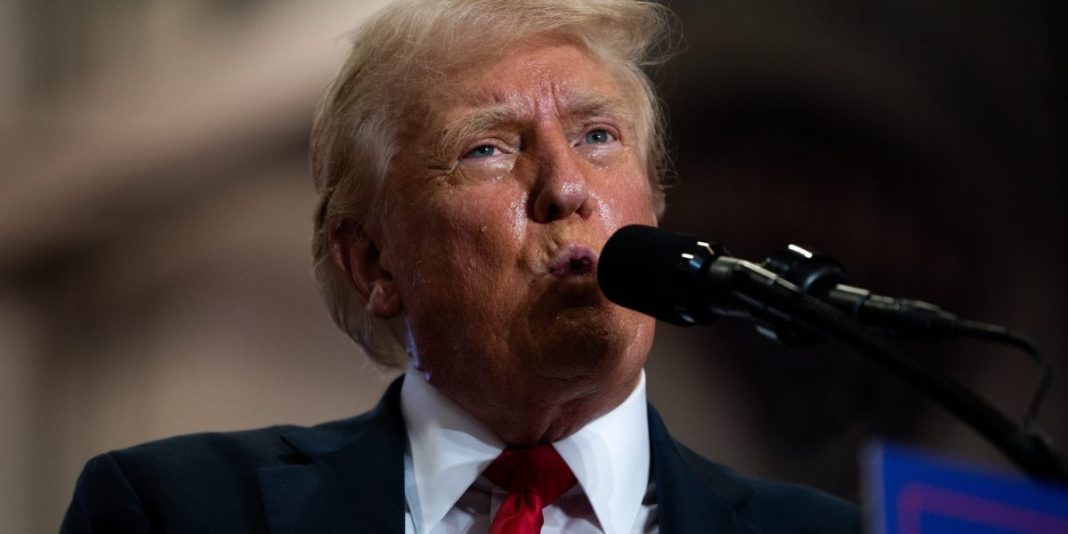Former President Trump believes the U.S. dollar is now so strong that it’s interfering with American manufacturers’ attempts to sell goods abroad, but a Macquarie strategist said his policies will boost the currency further.
Rising interest rates and a relatively resilient U.S. economy have helped lift the dollar in recent years. The ICE U.S. dollar index, a leading benchmark for the value of the greenback internationally, has soared nearly 13% since July 2021.
“We have a big currency problem,” Trump said in a recent interview with Bloomberg Businessweek, arguing the strong dollar has been a “tremendous burden” on key U.S. businesses.
He added that this strength now means “nobody wants to buy our product because it’s too expensive,” and made the case that other countries try to keep their currencies “weak all the time” to gain an advantage in exports.
While the former president’s message has sparked fears among some Wall Street analysts that he may seek to artificially weaken the U.S. dollar if elected, Macquarie’s global foreign exchange and rates strategist, Thierry Wizman, believes that’s unlikely.
“Former U.S. President Donald Trump has expressed a desire for a weaker USD, but his core policies (on immigration, tariffs, taxes) point to a stronger USD,” he wrote in a Monday note to clients.
Trump’s strong dollar policies
Trump has promised to clamp down on immigration, impose tariffs, and institute another round of sizable tax cuts after extending the Tax Cuts and Jobs Act of 2017. However, all of these policies would strengthen the dollar by creating inflation that forces real interest rates to rise, according to Wizman.
The recent surge in immigration, for example, has helped to ease the labor shortage and push down wage pressure in recent years, helping keep inflation at bay. If Trump’s anti-immigration policies lead to a reduction in migrants into the U.S., that could result in higher inflation, forcing the Fed to keep interest rates higher for longer. And because the difference in interest rates between the U.S. and other nations is so critical to the value of the dollar, higher rates will likely strengthen the U.S.’s currency.
Similarly, studies show that tariffs serve to increase the price of imports, and therefore, often exacerbate inflation. This can, once again, force the Fed into more hawkish policy, increasing the value of the dollar.
Finally, tax cuts tend to juice the economy, boosting corporate spending and investment, which can also result in higher inflation, and as a result, a stronger dollar.
Wizman isn’t alone in his assessment of the potential impact of Trump’s core economic policies on the dollar either. AXA Investment Managers’ head of macro research, David Page, argued in a Friday report that Trump’s policies, particularly tariffs, will “make Fed monetary policy easing less likely,” boosting the dollar.
“The trade-weighted dollar has indeed tracked Trump’s positive net approval ratings over recent years, suggesting the market shares a similar assessment,” he noted.
Possible direct policy interventions
While Trump’s core economic policies, as forecast by Wall Street today, are likely to strengthen the U.S. dollar, there are potential direct policy interventions that could weaken it.
Wizman noted that, if elected, Trump could pressure the Federal Reserve to cut interest rates; ask the Treasury Department to sell dollars from its reserves; ask allies to purchase their own currencies instead of the dollar in the open market; impose restrictions on overseas investments into to the U.S.; or offer tariff-free access to U.S. markets—but only for countries that strengthen their own currencies.
Still, Wizman argued that these interventions are either unlikely to happen or unlikely to work. Trump won’t be able to bully the Fed or the Treasury into changing their policies, for example, at least without disastrous impacts to the U.S. currency’s status, he said.
And if the former president were to attempt to curtail direct foreign investment into the U.S., that would lead to manufacturing job losses. “Indeed, Trump has previously said that he favors [foreign direct investment] into the U.S. in support of job creation and higher manufacturing wages in the U.S,” Wizman pointed out.
Finally, Trump could threaten tariffs against China in an attempt to force President Xi Jinping to devalue the yuan. “But this is more likely to backfire by getting countries to accept the tariffs and devalue their currencies, creating a vicious loop of more tariffs and more USD strength,” the strategist said.
The only serious avenue for Trump to devalue the dollar, according to Wizman, involves offering trade concessions to emerging market countries in exchange for them increasing the value of their currencies. “This is possible, but it would…lead to a lowering of tariffs, something which Trump has not yet endorsed as a possibility. Moreover, it would run counter to using the tariff system to raise revenue and defray/offset tax cuts,” Wizman wrote.


